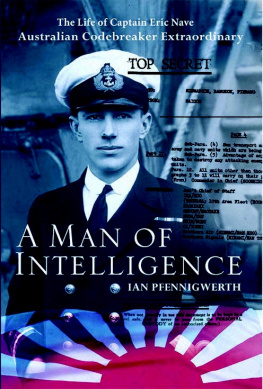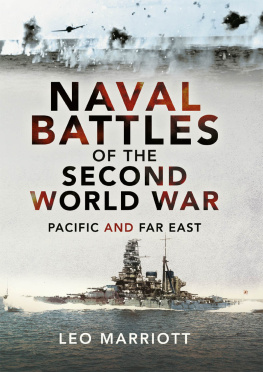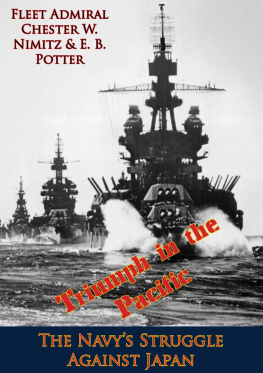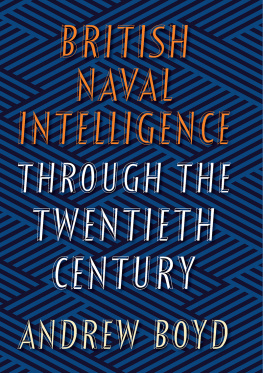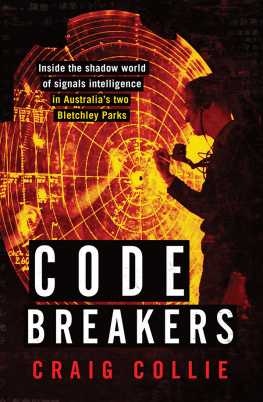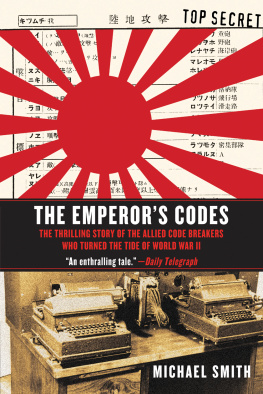DOUBLE-EDGED
SECRETS
DOUBLE-EDGED
SECRETS
U. S. Naval Intelligence Operations
in the Pacific during
World War II
W. J. HOLMES

BLUEJACKET BOOKS
NAVAL INSTITUTE PRESS
Annapolis, Maryland
This book has been brought to publication by the generous assistance of
Marguerite and Gerry Lenfest.
1979 by the U.S. Naval Institute, Annapolis, Maryland
All rights reserved. No part of this book may be reproduced or utilized in any form or by any means, electronic or mechanical, including photocopying and recording, or by any information storage and retrieval system, without permission in writing from the publisher.
Charts by Dorothy deFontaine
First Bluejacket Books printing, 1998
ISBN 978-1-61251-255-6
The Library of Congress assigned Catalog Card No. 78-70779 to the hardcover edition of this book.
CONTENTS
To
the memory of
JOSEPH JOHN ROCHEFORT
18991976
Captain, U.S. Navy
This book has been brought to publication
with the generous assistance of Marguerite and Gerry Lenfest.
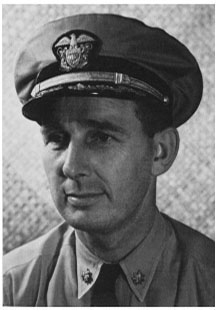
Joseph J. Rochefort
Courtesy: Mrs. Janet Rochefort Elerding
WHEN I was a student at the University of Hawaii following World War II, I knew Dean W. J. Holmes as a topflight professor of engineering. But to those who were involved in naval intelligence operations against Japan during World War II, he will always be remembered as Commander (and later Captain) Holmes of the Combat Intelligence Unit, one of the select few who handled the supersecret Ultra messages which the U.S. Navy produced from having broken Japanese codes. This work of Holmes was so secret that even after the war, when I was his student, I could only guess at what his role had been in the Pacific victory.
Double-Edged Secrets is the eyewitness story of the remarkable organization that collected, analyzed, and disseminated naval intelligence throughout World War II. Making use of the unique insights intercepted Japanese messages afforded U.S. Navy planning, Holmes now brings illuminating new dimensions to the story of the war in the Pacific, especially concerning such events as the attack on Pearl Harbor, the breaking of the incredibly complex Japanese ciphers, the use of Ultra intelligence, the Battle of Midway, the targeting of U.S. submarines against Japanese aircraft carriers, American antisubmarine warfare, and the decision to shoot down Admiral Yamamotos plane. Holmess story is the raw material of adventure fictionbut it is all true, and it is told in a manner that is at the same time fascinating and professional.
Although Double-Edged Secrets is about intelligence during World War II, it has lessons for us today. In my capacity as the first chairman of the U.S. Senates Select Committee on Intelligence, and now as a continuing member of that committee, I have come to learn more and more about the crucial service that U.S. intelligence has performed for the American people. An important part of my work on this committee concerns the dilemma which is the heartand the titleof this book: the contradiction that secrecy can sometimes harm national security as well as the enemy. Many instructive incidents illustrating this dilemma are provided throughout the book.
Holmes describes the predicament faced in deciding whether or not to use Ultra information to intercept and shoot down the plane carrying Admiral Yamamoto, Japans most outstanding naval officer. Fortunately, the dramatic death of Yamamoto did not tip off the Japanese that their communications were insecure.
A more tragic outcome resulted from the decision not to disseminate Ultra information concerning the positions of Japanese submarines late in the war. This information was given extremely limited distribution lest the Japanese should discover that their most sophisticated code had been broken. As a result, the USS Indianapolis never learned that there was a Japanese submarine in her path. The Indianapolis went down in fifteen minutes, and the total loss came to 883 men.
In relating these examples, Holmes skillfully acquaints the reader with the deeply perplexing operational and moral questions that faced U.S. commanders as a result of the extraordinary insight provided them through cryptanalysis. The source was so exceedingly valuable that it had to be protected at all costs, yet should such costs include, for example, the many lives aboard the Indianapolis? It is in studying these decisionsand their consequencesthat we may better learn to resolve the continuing problem of secrecy.
All in all, Double-Edged Secrets is much more than just a thrilling story and a lesson concerning the dilemmas of sensitive intelligence. Based on Holmess unique personal experience, it is a tribute to the courageous and brilliant men whose work was so secret that they could not be recognized, and whose contribution was so vital that it is no exaggeration to say that without it the Pacific conflict might have been waged on the coast of California. In addition to intelligence, these men had imagination, enthusiasm, a very-much-needed sense of humor, and an unflagging capacity for good, hard work. One of the most enterprising and important of these unsung heroes is the author of this enjoyable and rewarding book.
| DANIEL K. INOUYE |
| U.S. Senator from Hawaii |
NO RECORDS were kept of some of the incidents related in this book and the records of others have been too highly classified to be consulted. The thirty-nine-volume Hearings Before the Joint Committee on the Investigation of the Pearl Harbor Attack, seventy-ninth Congress, is the source of most of the information on communications intelligence before that attack, and Samuel Eliot Morisons fifteen-volume History of United States Naval Operations in World War II is the reference for the general history of that war; but the principal source of information is personal recollection. The book is a first-person account of experience in a highly successful intelligence organization that conducted its business without the cloak-and-dagger actions, assassinations, murders, sedition, and seduction featured in many books about intelligence. Yet, it elucidates principles of intelligence which, had they been applied during the past thirty years, might have saved the United States from much trauma.
Experience proved that intelligence functions best when limited to its proper tasks: the collection, collation, evaluation, and distribution of information concerning the enemy. Although, for best efficiency, those who work in intelligence must cooperate closely with those who use it, they must never attempt to usurp the functions of either those who make plans or those who direct operations.
As this book demonstrates, secrecy is often essential to the security and continuing production of intelligence, but it is a double-edged weapon that must be wielded carefully lest it wound the wielder more deeply than the enemy. Restricting intelligence to those who need to know sometimes requires both omniscience and omnipotence.
Without the help of Drew W. Kohler, this work could not have been completed. He was my translator, typist, consultant, and critic. David A. Ward contributed many valuable corrections and criticisms. John A. Harrison is a mine of information on the Translation Section. I am grateful to Donald M. Showers for steering the manuscript through the maze of Washingtons intelligence community, in order to obtain security clearance. Jack S. Holtwick and Paul T. Yardley read and corrected parts of the manuscript. I have contributed all the errors. I am grateful to Richard W. Emory and Elizabeth B. Holmes for support and encouragement. I am deeply indebted to Mary Veronica Amoss, whose patient and skillful editing has removed my many inconsistencies, redundancies, and errors and greatly improved the organization of the text to make this a more readable book.
Next page

